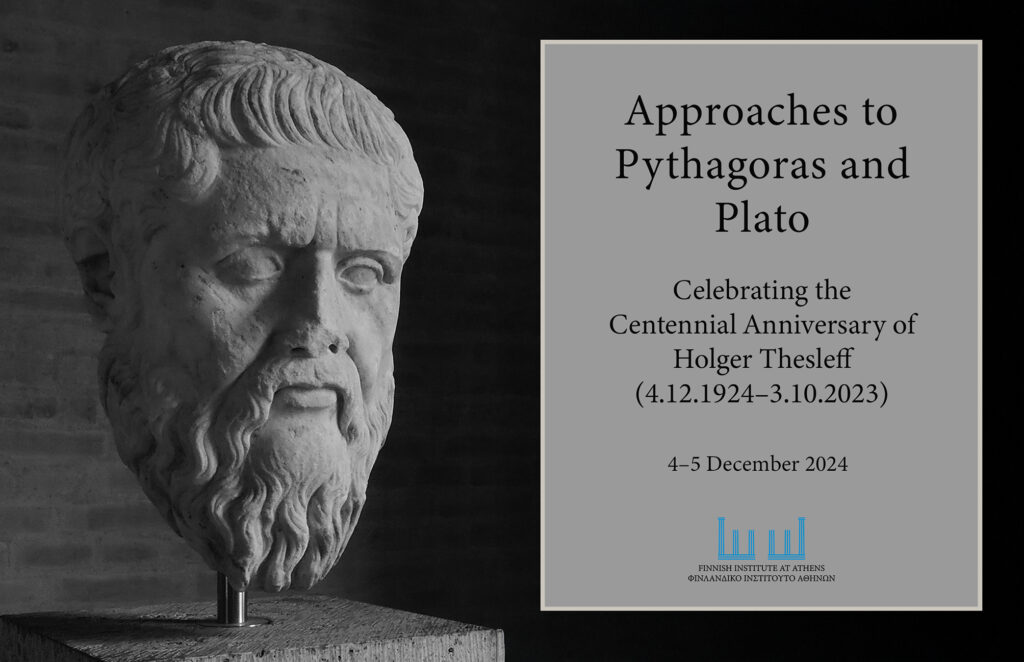
Lassi Jakola (FIA) and Pauliina Remes (Uppsala)
Holger Thesleff (1924–2023), a Finnish philologist and former professor of Greek philology at the University of Helsinki, died on 3 October 2023 at the age of 98. Thesleff was an internationally acknowledged scholar of ancient Greek philology and philosophy. His extraordinarily long scientific career spanned no less than 9 decades, from late 1940s to early 2020s. Thesleff’s first book Djupsjöseglare (1951) documented the last commercial circumnavigation ever conducted on a motorless sailing vessel, the four-masted windjammer Passat. And while his early scientific work focused on Greek language and linguistics (e.g. Studies in Intensification [1954] and Studies in the Greek Superlative [1955]), internationally Thesleff is probably best known for his work on ancient Greek philosophy, especially Plato and Pythagoreanism.
In the 1960s, Thesleff published two important studies on the Pythagorean tradition. An Introduction to the Pythagorean Writings of the Hellenistic Period (1961)and The Pythagorean Texts of the Hellenistic Period (1965) have maintained their position as classics in the field of Pythagorean pseudepigrapha to present days. In Plato scholarship, Thesleff is known for three suggestive and methodologically ground-breaking monographs: Studies in the Styles of Plato (1967), Studies in Platonic Chronology (1982) and Studies in Plato’s Two-Level Model (1999), now conveniently available in Platonic Patterns (2009).
Besides his scholarly work, predominantly written in English, Thesleff contributed to popularizing Plato and ancient intellectual history in Finland and in other Nordic countries. He authored two introductory books on Plato and his philosophy (Platon [1987] and Platonin arvoitus [‘The riddle of Plato’, 2011]), and, together with Juha Sihvola, wrote a particularly wide-ranging introduction to ancient philosophy and intellectual history (Antiikin filosofia ja aatemaailma [1994]). In 2006, Thesleff was awarded the prize of the Alfred Kordelin Foundation for his great merits as a promoter of European humanism and classical heritage in Finland.
The workshop Approaches to Pythagoras and Plato, which is organized at the Finnish institute at Athens (FIA) on the occasion of Thesleff’s centennial anniversary, celebrates Thesleff’s scientific work, focusing especially on his contributions to Plato scholarship and the study of Pythagoreanism. The workshop’s contributors revisit select key ideas, methods and proposals of Thesleff’s scholarly work. You are most welcome to attend the celebratory gathering.
PROGRAM
Wednesday 4.12.2024
09:15–09:20 Petra Pakkanen (Finnish Institute at Athens, Director): Welcome words
09:20–10:00 Lassi Jakola (Finnish Institute at Athens) & Pauliina Remes (Uppsala): “Holger Thesleff (1924–2023): An Intellectual Biography”
Neglected Aspects and Nordic Perspectives
10:00–11:00 Mika Kajava (Helsinki): “Holger Thesleff’s Early Philological Work. From Intensification in Early and Classical Greek to Response Strategies in Early Roman Comedy”
11:15–12:30 Hannu Riikonen (Helsinki): “Keeping the Classical Tradition Alive: Holger Thesleff and the Legacy of Antiquity”
Pythagorean session
14:00–15:15 Constantinos Macris (Paris): “Sailing with Holger Thesleff in the Open Sea of the Post-classical Pythagorica (1961–2024)”
15:15–16:30 Phillip Horky (Durham): “’The Pronoia of Holger Thesleff”
17:00–18:15 Tua Korhonen (Helsinki): “Pythagoras and Plato on Metempsychosis: ‘A Kinship of All Life’, A Moral Argument or a Mere Metaphor?”
Thursday 5.12.2024
09:00–11:00: A visit to the Archaeological site of Plato’s Academy and the Digital Museum of Plato’s Academy
Platonic session
13:00–14:15 Debra Nails (Michigan): “Middle Thesleff”
14:15–15:30 Harold Tarrant (Newcastle): “Holger’s Episodic Approach to the Writing of Plato’s Republic”
16:00–17:15 Necip Alican (Istanbul): “The Ship of Neurath in Uncharted Waters: A Second Sailing with the Two-Level Model of Holger Thesleff”
